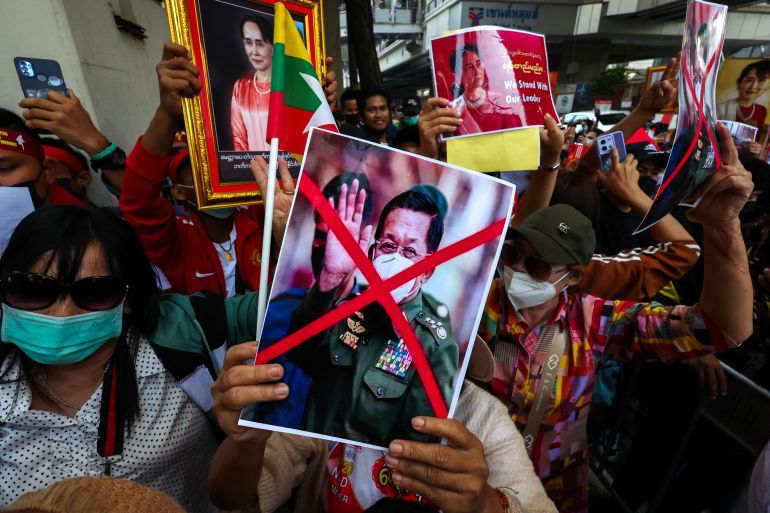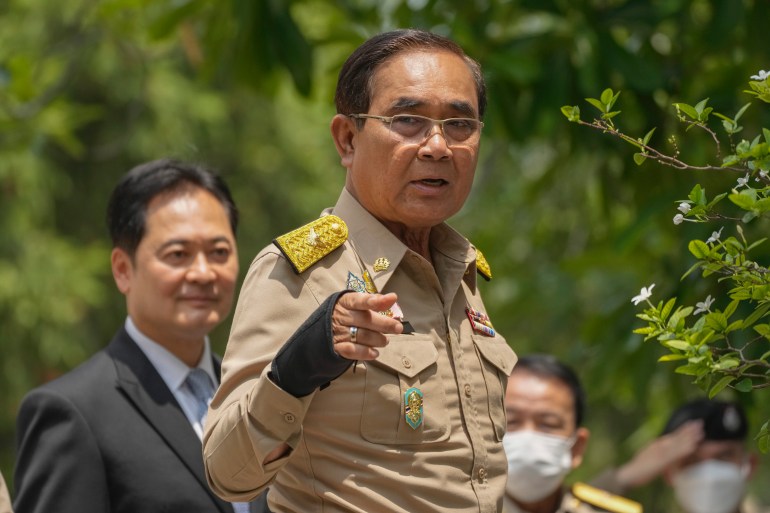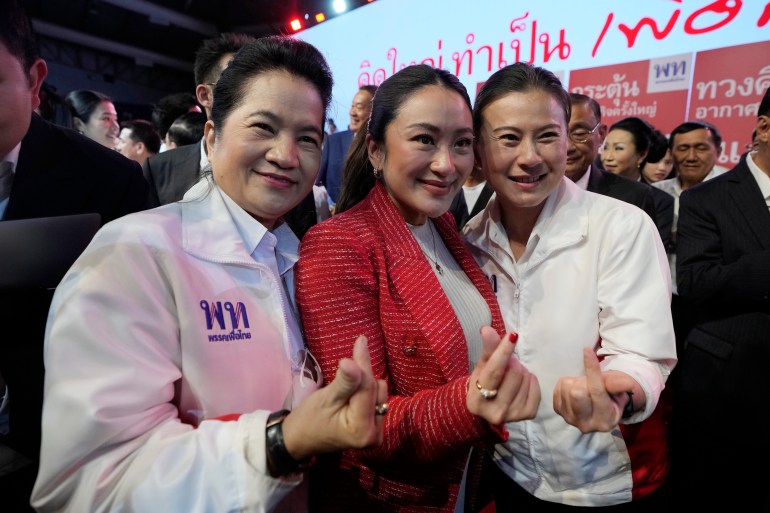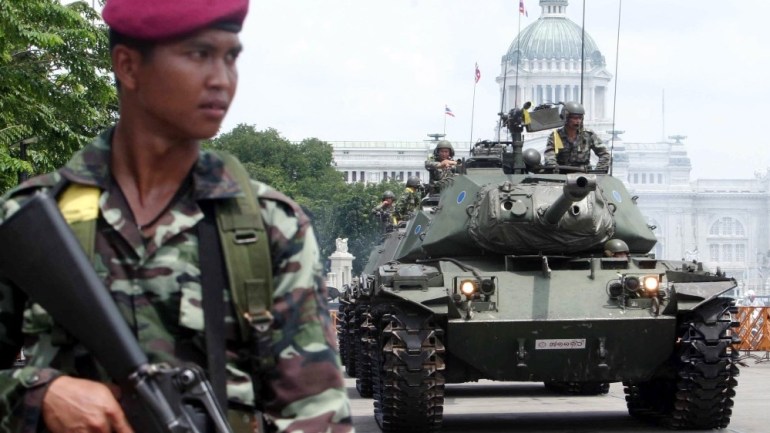Myanmar’s democratic struggle at stake in Thailand’s election
Myanmar people in Thailand hope a new government in Bangkok will take a tougher line on the coup leaders in Naypyidaw.

Bangkok/Yangon – Thailand’s elections are important not only for the many Thais seeking the end of quasi-military rule in their country but also for the more than 1.5 million Myanmar refugees and migrants who live in the Southeast Asian nation and hope a new government can put an end to Bangkok’s support for the military regime in Naypyidaw.
Thailand itself was rocked by a military coup in 2014 when General Prayuth Chan-ocha seized power from the elected government of Yingluck Shinawatra, solidifying his rule with closely-controlled elections five years later.
Keep reading
list of 4 itemsOpium cultivation surges since Myanmar military seized power: UN
Myanmar’s military honours anti-Muslim monk, frees prisoners
Myanmar generals banned from ASEAN until peace plan progress
With the country heading to the polls within the next few weeks, support for Prayuth appears to be slipping, and with it the preferential position of staunch ally Senior General Min Aung Hlaing, the man who seized power from Myanmar’s elected government led by Aung San Suu Kyi in February 2021.
For Ma Khine Thet, a young researcher from Myanmar, the election offers a glimmer of hope that with different people in charge in Bangkok, Thailand will throw its weight behind the anti-coup movement led by the National Unity Government (NUG) set up by Myanmar’s overthrown legislators.
“If the Thai opposition forms a government, they will likely support Myanmar’s democratic movement, probably in cooperation with the US. But I worry that China, who’s supporting Min Aung Hlaing, will pressure the new Thai administration,” said Ma Thet, who asked to use a pseudonym amid fears for her security.
Ma Thet fled to Bangkok after her former colleague was thrown in jail by the military last year. Like many other advocates, students, journalists and politicians from Myanmar, she is anxious about being deported back to the country, where she could face prison and even torture.
“The Thai military government and the Myanmar junta have a ‘big brother and younger brother’ relationship,” she said. “Thailand is among the very few countries that maintain a strong diplomatic relationship with the Burmese junta, and has considerable economic interests such as the Andaman Sea gas operations. Such interest prompts them to undermine our revolution.”

The election offers a chance for Thailand to reset its Myanmar strategy and change course, according to Thitinan Pongsudhirak, a professor at Chulalongkorn University’s Faculty of Political Science and a prominent expert on Thai-Myanmar relations.
“Thailand needs a qualitatively different government under a different leadership to take charge of the Myanmar portfolio because the existing approach is bankrupt,” Pongsudhirak told Al Jazeera in an interview in Bangkok. He argues that the new administration needs to engage with the NUG.
“Thailand’s Myanmar approach damages our country’s international standing. The two countries share a long border and we don’t want to see a Balkanisation of Myanmar. But this doesn’t mean Thailand should kowtow to the State Administration Council [SAC],” Pongsudhirak said, referring to the official name of the generals’ latest regime. “The anti-coup resistance is gaining more ground and they’re committed and fierce. We should work with them too. Thailand should also provide channels of humanitarian assistance.”
Military influence
On Monday, the Thai parliament was dissolved, paving the way for an election in May. An election must be held between 45 and 60 days after the dissolution.
Thailand has been ranked a flawed democracy by rights groups and the Economist Intelligence Unit. The country has endured 12 military coups since its first in 1932, and the parliamentary system is heavily skewed towards the Thai military, which has special powers to appoint members of the upper house.
Even though the opposition Pheu Thai and Move Forward parties appear to have considerable support in the polls, the outcome will not be determined by the number of votes secured in the lower House elections alone. The outcome of the votes by the 250 military-appointed Senators also counts. That means the two main pro-democracy parties will need more than 75 percent of the seats (376) to offset the military seats and form a government.
Despite the military-leaning parliamentary arithmetic, the opposition could still win.
Pheu Thai’s Paetongtarn Shinawatra, the daughter of former prime minister Thaksin Shinawatra and Yingluck’s niece, has widened her lead over Prayuth as the voters’ top choice in the latest opinion polls.
If Pheu Thai did manage to stitch together a coalition, they might take a less intransigent position within the Association of Southeast Asian Nations (ASEAN), according to Zach Abuza, a professor at the National War College in Washington, DC.
When Min Aung Hlaing’s regime executed four pro-democracy activists last year, Pheu Thai issued a statement reiterating its “unwavering support to the rights to rally for democracy and to be protected by the rule of law, including a free and fair trial and to be granted bail, for the citizens of any and every country, including our very own Thailand”.
The SAC has killed some 3,146 people and arrested more than 20,700, the majority of whom are still in detention, according to advocacy group Assistance Association for Political Prisoners (AAPP).

But Abuza, a Southeast Asian politics and security expert, doubts any new Thai government would be able to strongly challenge the Thai military’s preferences in Myanmar.
“The new Thai government will have to tread lightly and choose their battles very carefully,” he said. “They will not take on the Royal Thai Army, whose preference for the Burmese junta is well known.”
Thailand is one of the few countries to have shown open support to Myanmar’s coup leaders on the international stage.
But ASEAN, which also counts Myanmar as a member, is split on its response to the 2021 coup, with current chair Indonesia, Malaysia, the Philippines and Singapore taking a stronger position against the generals, while Thailand and its neighbours have been more hands-off.
Thailand’s special envoy on Myanmar last year urged the world not to “get stuck in cancel rhetoric” with the generals and called for countries to be more receptive towards the regime’s planned — and expected-to-be-delayed — polls, designed to override the 2020 Myanmar elections that handed a landslide victory to Aung San Suu Kyi and secure legitimacy for military rule.
“Condemnations, sanctions, ostracisation … have reached diminishing returns,” argued Pornpimol Kanchanalak, the special envoy, whose appointment raised eyebrows because of her past conviction in the US for illegal lobbying.
“Min Aung Hlaing and his generals have been building his election hopes on the Thai model. But of late, Thailand has been getting a lot of flack from within ASEAN and beyond about the way it has crossed Indonesia’s plans as ASEAN chair,” Laetitia van den Assum, a former Dutch ambassador to Thailand and Myanmar, told Al Jazeera, referring to Thailand’s attempts to convene a regional get-together with the SAC’s foreign minister despite the bloc’s decision to disinvite the generals and their political appointees to top meetings.
“There are Thai politicians who have a far more principled stand on Myanmar, and more Thai leaders should be aware that Myanmar is causing a host of problems for Thailand: the explosion in illicit narcotics, rising crime, waves of refugees, Chinese-controlled Special Economic Zones along their border which are havens for transnational crime,” Abuza said, adding that Prayuth’s cabinet had been “wilfully ignorant about the root cause of those [problems].”
United against the generals
There’s one prominent Thai voice scrutinising Prayuth’s Myanmar policy. During a visit to Taiwan late last year, now-dissolved Future Forward leader Thanathorn Juangroongruangkit severely criticised Prayuth’s support for Min Aung Hlaing and his government’s reluctance to allow humanitarian aid corridors to the Thai-Myanmar border.
“What the Thai government is doing to support Min Aung Hlaing’s regime is not the will of the Thai people. We do care — just that we are not much better,” he said, adding that if his allies could join in a governing coalition after the polls, Thailand would be able to help efforts for Myanmar to move from military rule to democracy.
Juangroongruangkit –— barred from running for public office after a series of court cases brought after Future Forward captured the imagination of many younger Thais in 2019’s polls — promised to undo Thailand’s active engagement with Min Aung Hlaing’s regime and leverage Thailand’s economic relationship with Myanmar to forge a democratic path ahead.
The charismatic entrepreneur founded the Future Forward Party in 2018 and won 81 of the legislature’s 500 seats in the last elections to finish third. But a slew of court cases followed and Future Forward was eventually dissolved by the Thai constitutional court, with most of its legislators joining its successor in parliament, Move Forward.

Some have expressed concern that the Thai government might resort to antidemocratic measures to secure victory in the election.
Ma Thet said she was anxious that Prayuth would restrict free speech, ban opposition politicians and spread fake news in order to return to power, but if Thailand’s opposition can overcome the not-inconsiderable hurdles and win, it might also give a boost to the NUG in its campaign to be seen as the true representative of the Myanmar people.
The civilian government sought to set up an office in Thailand as it has in countries such as Australia, Japan and South Korea, but without success, according to sources involved in the matter. Nevertheless, activists, politicians and journalists exiled from Myanmar have been allowed to stay in the country.
“The NUG stands for freedom, democracy and civil rights. Naturally, we support these principles in neighbouring Thailand and other countries. We’re deeply troubled by the plight of the Thai people. They have been deprived of genuine democracy,” a NUG cabinet minister told Al Jazeera, on condition of anonymity because of the safety of their colleagues across Thailand.
Al Jazeera understands that several cabinet-level officials are in Thailand and its border area with Myanmar, where refugees and anti-coup protesters have sought shelter. The Myanmar side of the border is dominated by the Karen National Union and its forces, led by ethnic minority Karen communities, who have clashed with the military in Myanmar for decades.
“We sincerely hope and fervently pray that Thailand will return to her free and fair democratic heritage, and the Thai people’s voice will be heard in this upcoming general election,” the minister told Al Jazeera in an interview. The minister’s location has been withheld for security reasons.
There has been no direct contact between the NUG and any Thai political party or politicians, the minister added. “Through the Milk Tea Alliance we are dedicated to democracy and human rights, but we are not involved with Thai politics,” they said, referring to a loose network of youth across Taiwan, Hong Kong and Southeast Asia who see themselves as engaged in similar fights against authoritarianism.
“If the Move Forward party were to win, or indeed any party dedicated to the values we are fighting for, we would happily engage with them and find meaningful ways to jointly work on the many issues which plague both nations,” they said.